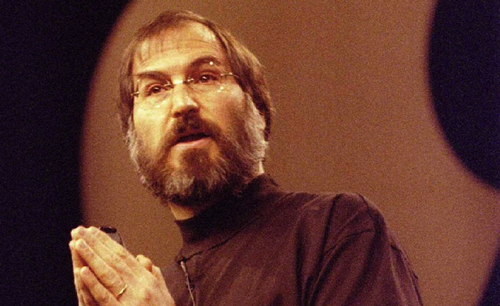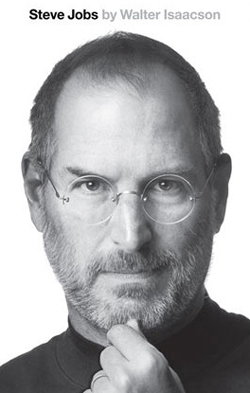
Walter Isaacson centres Steve Jobs: The Exclusive Biography on a single idea: that Jobs was an artist working at the intersection of the liberal arts and the technology industry. Jobs emerges from the pages of the enthralling biography as a figure who would be as at home on a movie set or a recording studio as he was in the offices of Apple, the quintessential Silicon Valley start-up.
As prickly a perfectionist as Stanley Kubrick and capable of unleashing torrents of abuse that would make Harvey Weinstein blush, Jobs brought the artist’s temperament and sense of beauty to the computer industry. As former girlfriend Tina Redse puts it, he believed that it was his job “to teach people aesthetics.”
Though many of Apple’s best ideas are attributable to Jobs, his real contribution to the computer industry came from his impeccable taste. As his blunt but accurate dismissal of Microsoft as having absolutely no taste reveals, there was no greater character failure in his eyes than a poor sense of aesthetics.
An absolutist for whom products were either “insanely great” or “shit”, Jobs pursued techno-zen with the focused madness of a monk seeking god. Jobs may not have been the greatest inventor birthed in Silicon Valley, but he was astute at packaging, commercialising and marketing product.
He could recognise a great innovation when he saw it — like the graphical user interface at Xerox Parc — and turn into a commercial proposition. Jobs also had an eye for talent. Whether it was Pixar’s great creative mind John Lasseter, genius engineer Steve Wozniak or design guru Jonathan Ives, he could pick out the best people in the world and turn their ideas into awesome products and money.
Whereas many other tech companies are obsessed with market research, Jobs believed that “people don’t know what they want until you show it to them”.
Isaacson’s meticulously researched book has an epic sweep. It covers Jobs’s middle-class upbringing with hardworking adoptive parents, the founding of Apple, his years of exile after his ouster in the 1980s, and his triumphant return to Apple where he helped to create a series of blockbuster products that restored the company to glory, before his premature death this year.
In Isaacson’s telling, Jobs’s preoccupation with combining good engineering with great design was midwifed by his suburban Californian upbringing. These twin passions enabled him to create the world’s most valuable technology company and change multiple industries in the process.
Jobs’s obsession with good design began in his adoptive father’s workshop, where he learnt from Paul Jobs that even the unseen back of a cabinet should be finely crafted with the best possible wood. The California of his childhood and youth was a fecund hothouse of creativity where Jobs had equal access to psychedelic drugs and vacation work with Hewlett-Packard — influences that shaped everything he did at Apple, Next and Pixar.
 Hippy mysticism was right at the heart of Jobs’s perception of himself and his company. A vegan for most of his life, Jobs apparently had terrible personal hygiene in the early years of his career and an obsession with Eastern religions. Jobs, writes Isaacson, “liked to see himself as an enlightened rebel against evil empires, a Jedi warrior.”
Hippy mysticism was right at the heart of Jobs’s perception of himself and his company. A vegan for most of his life, Jobs apparently had terrible personal hygiene in the early years of his career and an obsession with Eastern religions. Jobs, writes Isaacson, “liked to see himself as an enlightened rebel against evil empires, a Jedi warrior.”
One of the most illuminating points the book makes is that Jobs’s principles and vision for Apple have remained nearly constant since he and Wozniak worked on their first printed circuit prototypes to impress fellow members of the Homebrew Computer Club.
Whereas Apple co-founder Wozniak wanted to share his designs and give other computer hobbyists the freedom to customise and modify his products, Jobs always wanted end-to-end control over the user experience. Largely on the back of products Woz would have gladly given away, Jobs was worth more than US$250m by the time he was 25.
Apple’s iron control over the user experience — software, hardware and online services — is a principle that has frustrated as many users as it has delighted over the years as Apple rolled out industry-shaking products such as the Mac, iPod, iPhone and iPad. Apple has been more parts Darth Vader than Luke Skywalker for many years, just as yesterday’s hippy counterculture is today’s establishment.
Yet as Oracle CEO and Jobs confidant Larry Ellison says, Jobs has created the only lifestyle brand in the technology industry. It’s also one of the few hardware makers with decent profit margins. One does not have to be a fan of Apple’s restrictive ecosystem to wonder why no one else making cellphones and personal computers has managed to create interfaces and shells for their products as beautiful as those from Apple.
Isaacson had unprecedented access to Jobs as he wrote and compiled his book, with the Apple founder speaking about his life with as much candour as could be expected from a man well known for his “reality distortion field”. Knowing that his death was imminent, Jobs was apparently keen to put his side of the story across in Isaacson’s book.
The author also spoke to literally everyone — family, childhood friends, business rivals, board members, jilted confidants, former girlfriends — with figures like Al Gore, Bill Gates, Jonathan Ives and Wozniak all weighing in on his legacy. As a result, the book brims over with anecdotes about Jobs, some enlightening and some amusing.
Jobs’s obsession with a bootleg recording tracking the dozen or so takes it took The Beatles to record the final version of Strawberry Fields Forever is a fascinating reflection of his own creative process. Another piece of gossip that Isaacson is unable to verify is that newspaper mogul Rupert Murdoch described eating a vegan dinner at Jobs’s house as “a great experience, as long as you get out before the local restaurants close.”
Isaacson insists that Jobs and his family had no control over what appeared in the book, despite the fact that Jobs approached the author to write it. To his credit, Jobs did not demand to read the text and apparently did not try to excise some of the less flattering details about his life from the biography. The picture that emerges isn’t always attractive — Jobs often comes across as petulant, insensitive, self-deluding and arrogant.
The author does not back away from the fact that Jobs was a driven and ruthless businessman who betrayed lifelong friends casually and utterly destroyed underlings with his famous and remorseless tirades. Despite his apparent admiration of Hewlett and Packard, Jobs had no room for their philanthropic leanings or their humane management style in his own business.
Yet many of Jobs’s associates admit that his exacting demands got the best from them. His ability to get rid of nonperforming people and products before they dragged his company down surely also helped to keep Apple at the top of the league. Less understandable was his sometimes callous and offhand treatment of his family, especially his first daughter who he abandoned at birth.
There are elements of the book that are not completely satisfying, perhaps because of the sheer amount of ground it tries to cover. Isaacson’s discussion of the rivalry between Apple’s walled-garden approach and the open ecosystems championed by Microsoft with Windows and Google with Android is glib and superficial, for example. There’s also a fair amount of repetition in the book – it could have used slightly tighter editing.
Those blemishes aside, Steve Jobs: The Exclusive Biography is an essential read for anyone with even a passing interest in the computer industry. It’s equally compelling as a look at the past 35 years of Silicon Valley history, as a window into the philosophies and practices that built one of the world’s great companies, and as a portrait of a tech tsar who could bend people and silicon to his will, but who could not defeat the cancer that killed him. — Lance Harris, TechCentral
- Subscribe to our free daily newsletter
- Follow us on Twitter or on Facebook
- Visit our sister website, SportsCentral (still in beta)




